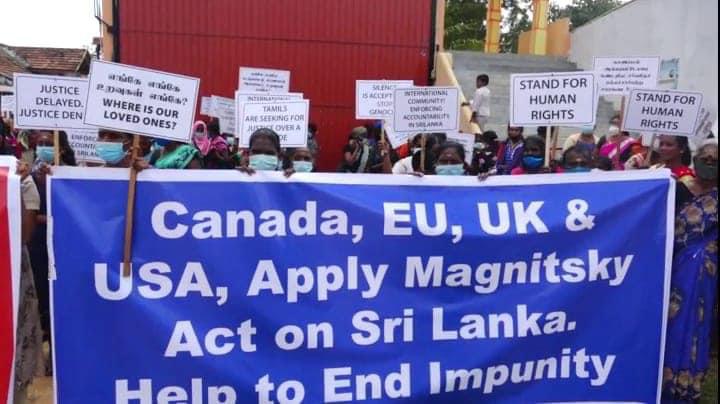Culminates in Targeted Sanctions for Human Rights Violations
by People for Equality and Relief in Lanka, December 15, 2021

Families of the disappeared demand sanctions and Sri Lanka to be sent to ICC. (Photo: Tamil Guardian)
Washington D.C.; December 15, 2021 — PEARL welcomes the sanctions of Chandana Hettiarachchi and Sunil Ratnayake by the United States under section 7031(c) of the Department of State, Foreign Operations, and Related Programs Appropriations Act for their involvement in gross violations of human rights. The designations relate to two emblematic cases of human rights violations in Sri Lanka which have long drawn criticism for their lack of redress and accountability. Hettiarachchi is a Sri Lankan naval intelligence officer credibly accused of being involved in the notorious “Trincomalee 11” murders from 2008-2009, while Ratyanake, a former Staff Sergeant in the Sri Lankan Army who participated in the murder of atleast 8 Tamil villagers in December 2000, received a high-profile pardon from President Gotabaya Rajapakasa in March of 2020 – a move representative of impunity at the highest levels of the Sri Lankan government. These sanctions, as well as the February 2020 designation of Sri Lankan Army Commander Shavendra Silva, are a welcome step towards justice and accountability, and an important vindication for families of the victims.
As mentioned in the statement by Secretary of State Blinken, the targeted sanctions on Hettiarachchi and Ratnayake are not the only actions being taken by the United States in support of accountability for past and ongoing human rights violations in Sri Lanka. Earlier in December, Representatives Meeks and McCaul, Chair and Ranking Member of the House Foreign Affairs Committee, sent a letter to Secretary of State Blinken urging the Biden Administration to prioritize a substantive and durable political solution that takes into account longstanding demands of the Tamil people in its Sri Lanka policy. Just last week, the Tom Lantos Human Rights Commission held a congressional hearing on Accountability and Human Rights in Sri Lanka, focusing on the endemic impunity and deteriorating human rights situation under the current Rajapakasa regime.
While we welcome this renewed focus on Sri Lanka from the United States, it is imperative that lessons are learned from past failures. The Sri Lankan state regularly makes promises and commitments regarding accountability to ease international pressure, without truly addressing its crimes. We saw this clearly during the previous Sirisena regime from 2015 to 2018, where an eagerness for progress – not only the part of the United States and the international community, but even from sections of the Tamil polity and and southern-based civil society, as well – led to the legitimization of a government before they had been held to their commitments. The result was the failure of any meaningful progress on accountability and justice, perhaps most clearly shown in the lack of any tangible results from the Office of Missing Persons.
Under the pressure of an ongoing economic crisis, the Rajapaksa regime will have no choice but to turn to the international community for assistance. PEARL encourages the sanctioning of further high ranking officials who have long been accused of participating in war crimes, crimes against humanity and genocide. In advance of the upcoming Human Rights Council sessions on Sri Lanka in March and September 2022, PEARL encourages the United States to continue taking a principled stance on human rights, and to support internationalized justice mechanisms and the exercise of universal jurisdiction to hold perpetrators accountable. Any mechanisms that are put in place must be effective, closely reported and monitored, and have sufficient safeguards in place to ensure durability, non-rescission and continuous pressure on the government. PEARL continues to stand ready to assist in this process.